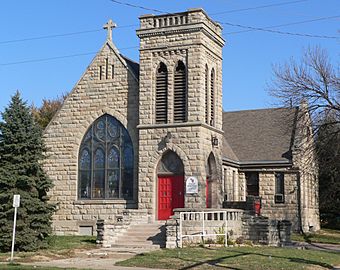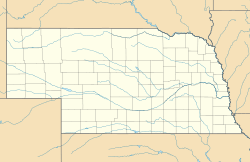St. Martin of Tours Episcopal Church facts for kids
|
St. Martin of Tours Episcopal Church
|
|

View from the southwest, across 24th Street
|
|
| Location | 2312 J St., Omaha, Nebraska |
|---|---|
| Built | 1899 |
| Architectural style | Late Gothic Revival |
| NRHP reference No. | 82000608 |
Quick facts for kids Significant dates |
|
| Added to NRHP | October 21, 1982 |
St. Martin of Tours Episcopal Church is a historic stone church located at 2312 J Street in the South Omaha area of Omaha, Nebraska. It was built in 1899 and has a special design called Late Gothic Revival style. This church is very important to the community.
It was the first Episcopal church built in South Omaha when that part of the city was just starting to grow. Today, it's the only Episcopal church from that time still standing in the area. Because of its history, it was named an Omaha Landmark and added to the National Register of Historic Places in 1982.
Contents
Church History
How St. Martin's Began
The St. Martin of Tours Episcopal Church was started in 1876 by a leader named Frank Millspaugh. He was the dean of Trinity Cathedral in Omaha. Millspaugh and another church leader, George Worthington, helped create many Episcopal churches in the Omaha area. St. Martin's was special because it was the very first Episcopal church built in the new town of South Omaha.
Unique Architecture
The design of St. Martin's Church was inspired by something called the Oxford Movement. This movement wanted to bring back older styles of Christian churches and worship from the Middle Ages. The church is made of limestone, which is a type of stone. This stone was actually saved from the ruins of a large house that burned down in the late 1880s.
A Church for a Growing Community
South Omaha grew very quickly, and many families from Eastern and Southern Europe moved there. Most of these new residents were Catholic, and they built their own churches to continue their traditions. Even though other Episcopal churches were started in the area, St. Martin of Tours is the only one that remains today. It stands as a reminder of the early days of South Omaha.
See also
 | Delilah Pierce |
 | Gordon Parks |
 | Augusta Savage |
 | Charles Ethan Porter |



